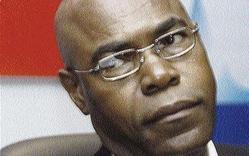
E.G. Hunter, president of the National Water Commission, says the funds will expand the Martha Brae scheme in Trelawny into neighbouring parish St. Ann. - File Lavern Clarke, Business Editor
National Water Commission has secured a ?16.23 million loan (J$1.4 billion; US$21.3 million) from French bank BNP Paribas to finance expansion of the Martha Brae water system to a wider area of the north coast.
Drawdown of the funds is pending a government guarantee, but NWC president E.G. Hunter is already planning for an April start to construction of the system's expanded phase.
The loan is to be paid out in two tranches: ?6 million at interest of 4.56 per cent, and ?7.25 million at 4.95 per cent, said Hunter. The remaining funds will cover financing costs and insurance for the loan.
The Finance Ministry has already approved the terms of the deal that NWC sealed with BNP Paribas.
"We're now in the process of securing the government guarantee," the water agency executive told the Financial Gleaner.
The Martha Brae pipelines and treatment system project was to lay 30,000 metres of pipeline over a 22-kilometre distance, and was originally meant to end at Braco, but new announcements of several planned developments have prompted the NWC to widen the project area and lock in business from the properties to be built.
The new pipelines that the ?16 million loan will finance will extend beyond Harmony Cove and Braco in Trelawny to Runaway Bay in St. Ann, where the new Bahia Principe Hotel owned by the Pi?ero Group and run by its locally registered company Hojapi Limited, is a target client.
In fact, Hunter says he plans in the future to lay pipelines all the way to Ocho Rios, locking in properties along the way.
The new job was awarded to Sogea SA, the French firm already engaged on the Martha Brae project that will double water supplies in the treatment system's service area to six million gallons per day.
The scheme is linked into the Great River system in neighbouring St. James.
No local brokers
Hunter said NWC had no local brokers for the BNP Paribas deal, having made the loan application through the French embassy.
NWC would have had to convince BNP Paribas that the project was commercially viable, since it is the agency, and not government, that is responsible for loans and loan servicing costs linked to its capital projects.
To generate income, NWC has implemented an 'impact pricing policy' under which it bills commercial operations and projects for the pipeline connections and water usage.
The price it quotes individuals is based on a 12 per cent return on the invested loan funds, said Hunter.
As for the expanded Martha Brae system: "We don't expect reflows from impact fees for the next couple years," said the NWC president.
lavern.clarke@gleanerjm.com

